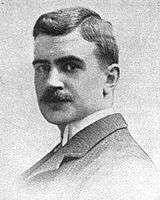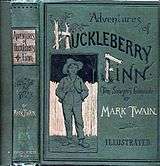E. W. Kemble
Edward Winsor Kemble (January 18, 1861 – September 19, 1933), usually cited as E. W. Kemble, and sometimes referred to incorrectly as Edward Windsor Kemble, was an American illustrator. He is known best for illustrating the first edition of Adventures of Huckleberry Finn and for his racist caricatures[1] of African Americans.


Biography
Kemble was born in Sacramento, California. In 1875, he was enrolled at a boarding school in Philadelphia, which was a center of artistic activity. His artistic talent was such that he was a successful contributor to periodicals by 1881. He became the major political cartoonist for the New York Daily Graphic while receiving his only formal artistic training at the Art Students League of New York.
When Life magazine was founded in 1883, Kemble became a frequent contributor to its early issues. He was a staff political cartoonist for Collier's from 1903 to 1907, for Harper's Weekly from 1907 to 1912 before returning to Collier's, and for Leslie's Weekly and Judge in the late 1910s.
His lively cartoons, some of the magazine industry's most mature work, attracted the attention of Mark Twain, who employed Kemble to illustrate Adventures of Huckleberry Finn. Kemble subsequently illustrated several other famous books, including Twain's Puddin' Head Wilson, Harriet Beecher Stowe's Uncle Tom's Cabin, Washington Irving's Knickerbocker History of New York, and many of Joel Chandler Harris' Uncle Remus stories.
Kemble lived in the Rochelle Park area of suburban New Rochelle.[2]
He died in Ridgefield, Connecticut, in 1933, aged 72.
References
- Martin, Jr., Francis (Jul 21, 2007). "To Ignore Is to Deny: E. W. Kemble's Racial Caricature as Popular Art". The Journal of Popular Culture. 40 (4): 655–682. doi:10.1111/j.1540-5931.2007.00429.x.
- Westchester, The American Suburb, Roger Panetta (2006); page 186
Sources
- Horn, Maurice, ed. The World Encyclopedia of Cartoons. 2d ed. Philadelphia: Chelsea House Publishers, 1999.
- Reed, Walt. The Illustrator in America, 1860-2000. New York: The Society of Illustrators, 2001.
- Samuels, Peggy, and Harold Samuels. Samuels' Encyclopedia of Artists of the American West. Secaucus, N.J.: Castle, 1985.
External links
| Wikimedia Commons has media related to Edward Winsor Kemble. |
- Works by E. W. Kemble at Project Gutenberg
- Works by or about E. W. Kemble at Internet Archive
- Comic Creator: E. W. Kemble via lambiek.net
- Kemble, E.W. (February 1930). Illustrating Huckleberry Finn. The Colophon, A Book Collectors' Quarterly (via University of Virginia)
- Kemble's Illustrations for Huck Finn (via University of Virginia)
- E. W. Kemble at Library of Congress Authorities, with 89 catalog records (mainly as "E. W. Kemble")
- Stuart A. Rose Manuscript, Archives, and Rare Book Library, Emory University: Letters to Ellis D. Robb, 1931